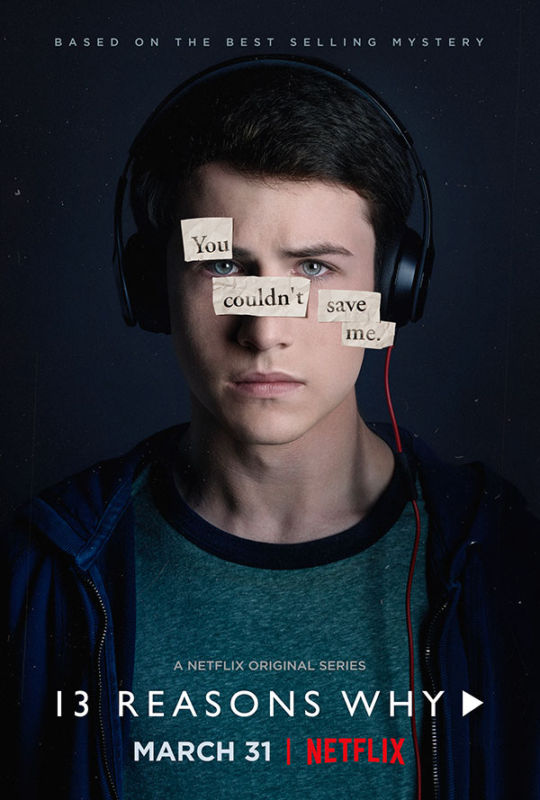Mental Health Professionals Are Calling For Netflix to Remove “13 Reasons Why”
If you haven’t heard about Netflix’s Original 13 Reasons Why then you are probably living under a rock of sorts. For the sake of this article, if you haven’t watched but need a crash course on it, take a look at the review by the wonderful Janine Jones.
The show, which is based off the novel of the same name by Jay Asher, premiered on Netflix on March 31st and since then has garnered quite a bit of backlash. The show centers around Hannah Baker, a teenager who commits suicide and leaves 13 cassette tapes detailing the reasons why she decided to end her life.
The show is heavy and graphic, there is no other way to spin it, and many mental health professionals are now asking Netflix to remove the show from their service because of the way it depicts some of the major issues in the show, like depression and suicide. 13 Reasons Why, at first, was praised for raising awareness on these very real and current issues, but experts are now disagreeing, saying that the show might cause the opposite effect. Instead of raising awareness about depression and suicide, they can be glorifying it.
In an interview on NBC’s TODAY Show, Harold Koplewicz, an adolescent psychiatrist and president of the Child Mine Institute, said this show should be “pulled off the air immediately.”
“Teenage suicide is contagious,” Koplewicz said in the TODAY Show Interview. “We know for over three decades that when kids watch television where they depict a suicide, they’re more likely to attempt and they’re more likely to actually kill themselves.”
Koplewicz goes on to say that one of the main problems with the show is that it is sending this message that there is no help available and that there is no hope. He also goes on to say that Netflix is defying decades’ worth of research by airing this show.
“Three decades ago, studies were done after there were four TV programs on the networks about teen suicides,” Koplewicz said. “About two weeks after the event, versus the two weeks before the show was seen on TV, there was a definite increase in both attempts and actual completions.”
Koplewicz also encourages parents to prevent their children from watching this show and if they have done so already, it’s important to speak with them about how suicide is not a solution to feeling depressed.
Dr. John Ackerman, a clinical psychologist and the Behavioral Health and Suicide Prevention Coordinator for the Center for Suicide Prevention and Research (CSPR) at Nationwide Children’s Hospital, wrote in a blog post that 13 Reasons Why “misses the mark” and also might expose those watching the show to “suicide contagion.” Suicide contagion is the exposure to suicide/suicidal behaviors within a certain group or media that increases, or results in, suicide and suicidal behaviors.
“In the last episode of the season, 13RW violates a central principle in media’s responsibility to the public regarding the prevention of suicide contagion by showing Hannah ending her life in shockingly graphic detail,” Ackerman writes in his blog post on the Nationwide Children’s Hospital website. “This is a show marketed toward young people. The vast majority of adolescents won’t experience contagion, but what about those who are overwhelmed, feeling vulnerable, or struggle with thoughts of suicide?”
Like Koplewicz, Ackerman also encourages parents to speak with their children about the events of the show, if they watch it.
Ackerman writes that the show provokes the “common adolescent fantasy” of “you’ll be sorry when I’m gone!”
“By portraying grief-stricken friends and family who wished they had treated Hannah differently, 13RW suggests Hannah’s suicide served its intended purpose,” Ackerman writes. “It promotes the idea that something permanent and shocking is the only way to make others understand the depth of one’s pain and what others have done to cause it.”
In response to the backlash, Netflix released a statement about strengthening their advisories before episodes because of concerns they have received. Originally, there were only three episodes with warnings – episodes that contained rape, sexual assault, and suicide.
“While many of our members find the show to be a valuable driver for starting important conversation with their families, we have also heard concern from those who feel the series should carry additional advisories,” Netflix said in a statement.
Netflix notes that the show already carries a TV-MA rating but that they will add an advisory at the beginning of the first episode as an “extra precaution for those about to the start the series.” They also said they will be “strengthening” the message and language in the previously existing advisories and will include the URL to 13ReasonsWhy.info, which is a website that offers information on organizations and support regarding the sensitive topics depicted in the show.
If you, or someone you know, is struggling with suicidal thoughts, please contact the National Suicide Prevention Lifeline at 800-273-8255. There is hope and there is help.
Your donation supports independent, student-run journalism at Pace University. Support the Pace Chronicle to help cover publishing costs.

